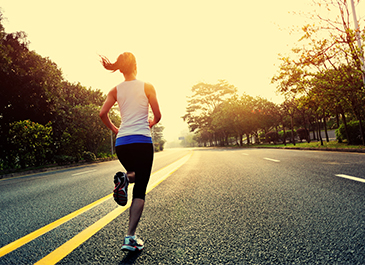Whether running in a trail race, hiking the local mountains or participating in a tournament, what you eat and drink before, during and after your activity can help or hinder success and recovery.
It’s important to give your body the appropriate fuel prior to exercise. If this is a major marathon or high-endurance activity lasting longer than 90 to 120 minutes, you need to begin preparing your body nutritionally in the weeks (and even months) prior. You can do this by eating lean and plant-based protein, complex carbohydrates and loads of fruits and vegetables for antioxidants.
If necessary, about 7 days before the event, adjust your carbohydrate intake to make up only 50 to 55 percent of your daily calorie intake. Fill up the remainder with protein and healthy fats. Then 3 to 4 days before the event, bump carbohydrates up to 70 percent of your calories and decrease fats to compensate. At this point, it’s also important to decrease the intensity of training, especially the day before. You want to rest completely before the event so that the carbs aren’t burned for energy until it really counts. When it comes to race, game or event day, eat 2 to 3 hours before the activity. Make sure you get a mix of easily digestible protein and carbohydrates, something like fruit with Greek yogurt or a trail mix with dried fruit and hemp hearts.
Hydrating prior to the activity is key. Try to consume 2 to 3 cups of water an hour or two beforehand. This helps alleviate the need for sports drinks, which are really only required for activity that lasts longer than 90 minutes consecutively—not a 30-minute jog or bike ride. Generally speaking, adults—and kids, for that matter—don’t need these types of drinks for activities. Sports drinks are benign treats that contain a lot of sugar and artificial flavours and colours, which have been linked to an increased risk of Attention Deficit Hyperactive Disorder in both kids and adults.
If you do sweat profusely during your longer stints of physical activity, extra hydration and electrolyte replacement could be warranted. Coconut water is a good source of electrolytes. It’s also easy to make a homemade sports drink: combine real fruit juice with water in a 50:50 ratio and, if you like, add ¼ to ½ teaspoon of salt to help your body absorb the sugar, fluid and electrolytes quickly and effectively. For most of us though, 1 to 2 cups of plain old water throughout an extended activity should be sufficient.
After the activity rush, remember to refuel again with healthy food sources. Within an hour after, focus on protein to replete muscle. But protein alone won’t do it. Include carbohydrates or your body will need to use the protein for energy instead of muscle repletion. If you’re on the go, chocolate milk or a premade smoothie provide both protein and carbohydrates, plus added fluids for hydration. Otherwise a balanced meal would be ideal. Think salmon or tofu with a barley salad or a nut butter and banana sandwich. Pile on the fruits and veggies as well. Exercise, especially if it’s high-endurance, generates free radicals that lead to inflammation. The antioxidants and water in the colourful produce help quench these troublesome molecules, leading to better recovery.
When Nicole, one of Choices’ Dietitians, isn’t taking part in a marathon that involves running after her two little ones, she’s usually at a hot yoga class. But after either activity, she always has healthy snack and a big bottle of water on hand. To ask Nicole more about sports nutrition, email her: nutrition@choicesmarkets.com.

